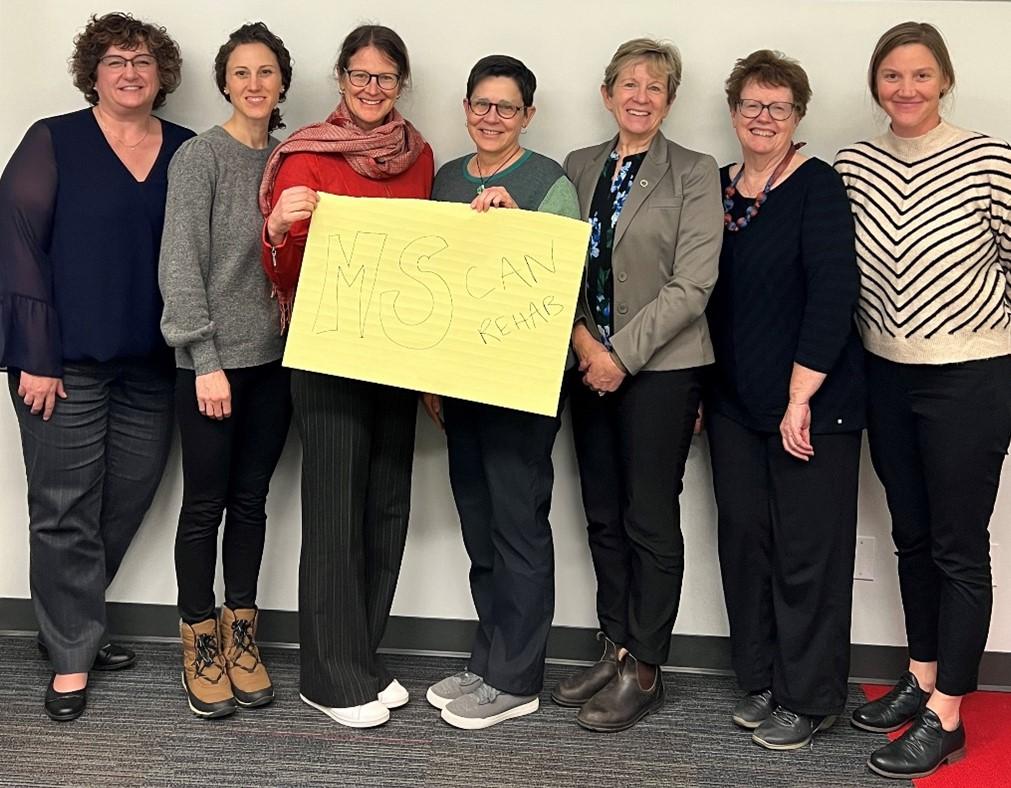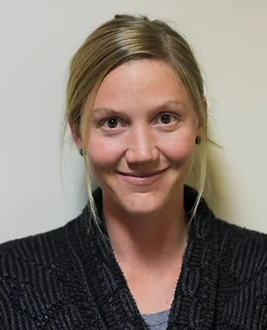
Over the last 30 years, MS has seen tremendous progress with the development of disease-modifying therapies that are more effective at managing disease activity. Despite this progress, there remains a need for effective approaches that address the progressive neurodegenerative processes and promote repair and regeneration of nerve fibres.
Rehabilitation targeted towards halting decline and restoring function has the potential to slow progression and enhance quality of life for people living with MS. Research and progress in MS rehabilitation however has been slow, hindering advances in care.

To accelerate advances in MS rehabilitation, a team of multi-disciplinary rehabilitation researchers and clinicians from across Canada have come together to form a collaborative network called ‘MSCanRehab.’ MSCanRehab brings together leaders with expertise in physiatry, neuropsychology, physical therapy, occupational therapy, exercise physiology, clinical epidemiology, and neuroscience. For the full list of founding members, please see below.
By establishing a network, MSCanRehab can more quickly and efficiently develop and test novel approaches, therapies, and technologies aimed at restoring function in people living with MS. Together, this team aims to lead large-scale, multi-site clinical trials to advance discovery and transform the field of MS. They will also work with industry to test innovative products and ideas to answer important questions and generate needed evidence for people living with MS.

"By bringing Canadian rehabilitation scientists together, MSCanRehab is setting research priorities and conducting collaborative clinical rehabilitation trials to move the field forward at a faster pace. The scientists of MSCanRehab intend to test new treatments that result in high quality healthcare and improved quality of life. We are particularly interested in interventions that promote neuroplasticity and work to improve fatigue and restore lost functions, like walking, hand function, thinking and memory."
Dr. Michelle Ploughman, Memorial University
Potential rehabilitation-based interventions of interest include topics such as robotics, neuromodulation, neuroplasticity-promoting drugs combined with rehabilitation, devices, telerehabilitation, exercise, task-oriented training, symptom management, and comprehensive rehabilitation.
By undertaking clinical trials together, the platform can determine rapidly whether a treatment may work, how it works, and for whom it works best. In this way, MSCanRehab aims to advance rehabilitative care of people with MS in Canada and worldwide.

"This is how change happens – collaboration! This is the team to lead this work combining years of clinical practice with years of research work in MS recovery, rehab, and symptom management. Together we can do better work faster to benefit the MS community. We combine interdisciplinary perspectives which are needed in comprehensive MS care. Our network will also help ensure long-term leadership and momentum in MS rehab and recovery."
Dr. Sarah Donkers, University of Saskatchewan
Founding Members of MSCanRehab:

Dr. Michelle Ploughman is a neuroscientist and physiotherapy researcher focusing on creating novel and potentially powerful rehabilitation interventions that not only restore function but that also promote brain plasticity. She is a Canada Research Chair (Tier II) in Rehabilitation, Neuroplasticity and Brain Recovery and Assistant Professor in Physical Medicine and Rehabilitation in the Faculty of Medicine, Memorial University. Dr. Ploughman has used knowledge gained from 30 years of experience in stroke and MS rehabilitation to try and solve problems that are important for patients and provide better tools for health providers. More about Dr. Ploughman - here.
Dr. Sarah Donkers is a registered physiotherapist, an Assistant Professor in neurorehabilitation at the University of Saskatchewan, and recently appointed as the Provincial Director of MS Clinical Research. Dr. Donkers has worked clinically for over 10 years as a physiotherapist specialized in neurological conditions. Dr. Donkers’ program of research focuses on improving the access to and quality of comprehensive rehabilitation interventions to promote functional neurorecovery and optimize quality of life for people living with MS. More about Dr. Donkers – here.
Dr. Marcia Finlayson is a Professor in the Faculty of Health Sciences in the School of Rehabilitation Therapy of Queen’s University. She started her career as an occupational therapist providing clinical services to people with a wide range of conditions and functional limitations. Dr. Finlayson's research program focuses on developing, implementing, and evaluating self-management programs and rehabilitation services to enhance the health and well-being of people affected by multiple sclerosis (MS). Her specific interests include falls prevention, fatigue management, caregiver support, and utilization of health-related services. More about Dr. Finlayson – here.
Dr. Katherine Knox is an Associate Professor at the University of Saskatchewan, Department of Physical Medicine and Rehabilitation. Her clinical practice includes neuro-rehabilitation services, with a special interest in multiple sclerosis. She obtained her fellowship training in Physical Medicine and Rehabilitation at the University of Saskatchewan (2006), and her Doctor of Medicine and Kinesiology degrees at McMaster University. She is a primary investigator with the Cameco MS Neuroscience Research Center at the University of Saskatchewan. Her clinical research focuses on gait, exercise behaviour, long-term outcomes, and quality of life for people with multiple sclerosis. More about Dr. Knox– here.
Dr. Nancy Mayo is a Professor in the Faculty of Medicine and Health Sciences and School of Physical and Occupational Therapy. She is a health outcomes, health services, and population health researcher with interests in all aspects of disability and quality of life in people with chronic diseases and the elderly. She currently has research projects in multiple sclerosis, cancer, seniors' health, stroke, hip fracture and HIV. In all these areas, she focuses on the measurement of health outcomes, the application of modern statistical methods, and knowledge translation. More about Dr. Mayo – here.
Dr. Lara Pilutti is an Associate Professor in the Interdisciplinary School of Health Sciences. She obtained her doctorate degree from McMaster University (Kinesiology) where she examined the role of adapted exercise interventions for persons with progressive multiple sclerosis. Dr. Pilutti completed a post-doctoral fellowship in the Exercise Neuroscience Research Laboratory at the University of Illinois Urbana-Champaign. She went on to become an Assistant Professor in the Department of Kinesiology and Community Health at UIUC before joining the Faculty of Health Sciences at the University of Ottawa. Dr. Pilutti’s research focuses on the role of exercise in the management and treatment of disability arising from neurological disorders, particularly multiple sclerosis. More about Dr. Pilutti – here.
Dr. Lisa Walker is a Clinical Professor at the University of Ottawa Brain and Mind Research Institute. Dr. Walker is trained in clinical neuropsychology. Her research is focused on evaluating various aspects of cognitive health in individuals with multiple sclerosis. She is currently focused on cognitive fatigability, the cognitive impact of stem cell therapies, assessment and longitudinal evaluation of cognition, and the relationship between cognition and biomarkers of disease activity. More about Dr. Walker – here.